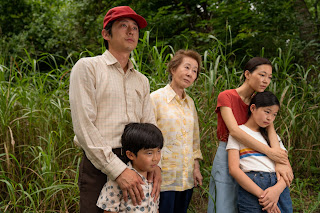Movie Review - Minari
Despite this being an immigrant story about an Asian family who moves to middle America, this film, written and directed by Lee Isaac Chung, demonstrates more pride and love of middle America than Hillbilly Elegy. Hillbilly Elegy is a biographical tale, based on the memoir by J. D. Vance, retelling his childhood. This film is a quasi-biographical tale, based on the childhood of Chung himself. Chung wasn't born in that area. Vance was. Yet, Chung shows more appreciation and dedication about the area than Vance's film. Hillbilly Elegy is more critical of hillbillies and more about getting away from them, whereas this film is in effect about people basically becoming hillbillies or learning to embrace them.
Steven Yeun (Okja and The Walking Dead) stars as Jacob Yi, a Korean immigrant who lived with his wife and two children in California. He worked at a hatchery where his main job was separating baby chickens, separating the male chicks from the female chicks. It's a tedious job with no hope of expansion or getting him out of poverty. Jacob dreams of starting his own farm and becoming a success. He's somehow able to save up and buy acres of land in Arkansas. His hope is to make it a success and make a better life for his family.Instead of a nice farm house and the normal things a farmer would have, Jacob has nothing. His family of four gets a small, mobile home, basically a trailer, a large box on wheels. Jacob's wife is obviously not impressed. In order to begin his farm, Jacob needs to build a filtration system, which requires him to find a spot to dig a well for water. To do that correctly, Jacob would have to spend a lot of money, money he doesn't have. He decides to do it himself. His focus and devotion to doing the farm himself are taking away from his focus and devotion to his family, which he's seemingly neglecting. The film though never truly makes that complaint feel like an issue, worthy of much drama.
Alan S. Kim plays David Yi, the young son of Jacob. He's probably 5 or 6. He's constantly told by his parents not to run. It seems unnecessarily stern, but the reason he shouldn't run is because David has a heart defect. Presumably if he runs or exerts himself too much, he could die. The film never really makes an issue out of this. Some of the text of the film is meant to imply or outright state that David's health is less of a concern for Jacob. Yes, given where they live, the family is further away from a hospital, so if David has a heart problem, getting him help is more difficult. Yet, that never really becomes something that is realized here. David's heart is less of an issue than the fact that he wets the bed.Yuh-jung Youn (Sense8 and The Housemaid) co-stars as the aforementioned grandmother to David. She's his mother's mother. She comes to visit from South Korea in order to help her daughter and son-in-law. Basically, she's a babysitter for her grandchildren, while Jacob and his wife work at the hatchery and on the farm. Her relationship with David becomes the focus of this film. David basically doesn't like his grandmother. He doesn't like the food she makes. He doesn't like that he has to share his bedroom with her. He doesn't like her smell. Despite that, she's always jovial, loving and forgiving. She's the opposite of Glenn Close in Hillbilly Elegy.
David's relationship with his grandmother becomes the most entertaining part of the film as with Hillbilly Elegy. Other than that, we're just watching this immigrant family struggle in poverty but be loving and resilient through the tough times. We also see scenes of them trying to assimilate into the community. There's a through-line about religion that is also somewhat interesting, particularly in Jacob's resistance to religion and veritable atheism, whereas his wife wants to embrace religion. Unfortunately, the film never delves into why Jacob is practically an atheist.Yeun's performance though is very good as a stubborn man who is determined to succeed. He doesn't become maniacally driven. He does clash with Yeri Han who plays Monica, his wife. They have tense moments and also very tender ones like a warm scene where Monica gives Jacob a bath, washing his hair, despite them not having enough money to afford running water.
There were two films this past year about Asian immigrants or Asian-American characters that I think delve into some of these issues a bit more. One is Driveways (2020). The other is Tigertail (2020). However, I think when it comes to a Korean family adjusting to life in North America, I got more out of the sitcom Kim's Convenience. I didn't even really get the importance of the titular object, which is a kind of plant.Rated PG-13 for some thematic elements and a rude gesture.
Running Time: 1 hr. and 55 mins.
In select theaters, including Rehoboth Beach and VOD.















Comments
Post a Comment